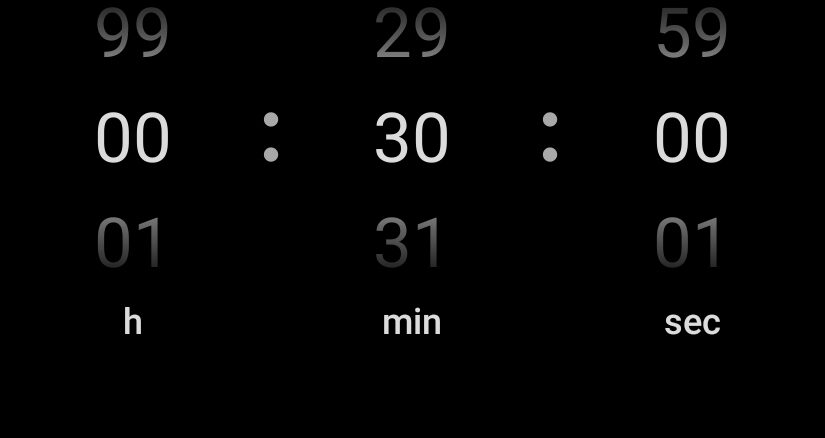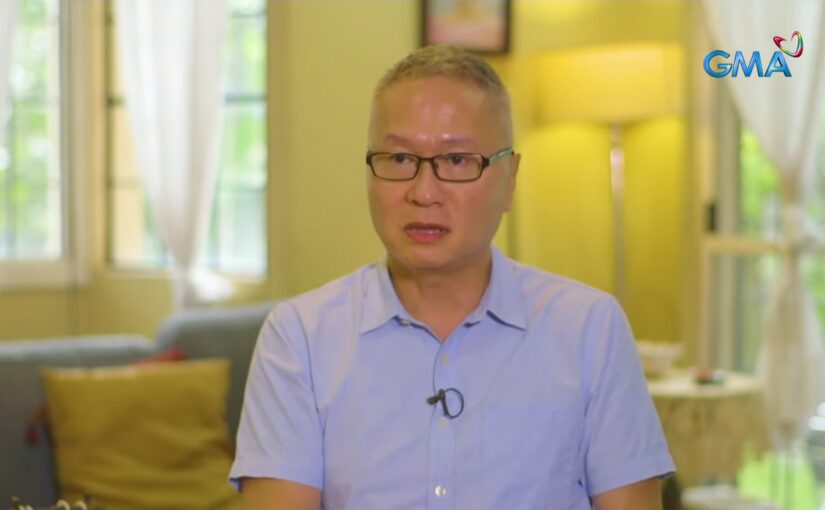Listen to this on Spotify:
Tag: Family Counseling
Two Shrinks Over Drinks! With Lou Lasprugato
Hi Friends!
I am excited to share a new series with you! I call this one, “Shrinks Over Drinks!” And this episode will be called, “Two Shrinks Over Drinks!”
Have you ever wondered how it feels like to eavesdrop on a couple of shrinks having a casual conversation? Well, welcome to our world! Hope it doesn’t turn into a rude awakening! But seriously, this was a wonderful conversation with a fellow ACT therapist. Hope you enjoy your eavesdropping!
In this video, I feature a conversation with Lou Lasprugato who is an internationally recognized trainer and behavioral health provider. He’s a licensed Marriage and Family Therapist, with private practices in both California and Virginia (United States), and Peer-Reviewed Trainer in Acceptance and Commitment Therapy (ACT) with the Association for Contextual Behavioral Science, for which he also serves as chair of the Training Committee.
Here’s how Lou describes the video:
“I was delighted to have been hosted by Nathaniel Chua for his new podcast series entitled “Shrinks over Drinks” where we touched upon various ACT-related/informed topics, including eclectic vs integrative approach, clinical implications of functional contextualism, rule-governed behavior, couples therapy, ACT-flavored movies, our ACT origin stories, love, humanity, and more!”
For more information about Lou and his work please visit: www.loulasprugato.com!
We will talk about a number of exciting and interesting stuff like, what movies remind you of ACT and what’s love got to do with our work and many more!
For more information about One Life Only Counseling Services, please go to www.onelifeonly.net!
Pain vs. Suffering
by Nathan Chua
There’s an old aphorism that goes, “Pain is inevitable, suffering is optional,” credited to Japanese writer, Haruki Murakami.* Have you seen a kid who was disappointed by a parent or primary caretaker who wasn’t as appreciative of a pyramid of blocks it created, and then proceeds to wipe out the masterpiece with one quick stroke of an arm? I do remember myself doing so but can’t remember what my creation was. If we look closely, we as adults sometimes revert to this way of coping with the inevitable hard feelings or the pain we get in situations at home, at work, and at random moments in our days.
I am here borrowing a series of questions you might ask yourself when faced with a challenging moment in these situations. This can help you see if you may be causing more pain on top of what is already an emotionally difficult moment. I borrowed this from a book written by experts in functional analytic psychotherapy.**
- In that situation, can you notice what it is that you do in reaction to it?
- If another person is involved, what do they do in response to your reaction?
- What do you think it is that you do that aggravates or contributes to the problem?
- Did the way you reacted show up in other places or with other people?
- What is immediately rewarding about what you do?
- What is it costing you in the short term?
- What do you foresee will happen if you continue doing what you’re doing in the long run?
- What would happen if you stopped doing what you’re doing now? What would you have to be willing to accept?
- Is there a purpose important enough for you to accept or face that?
In your relationships with your partner or your family:
When people in close relationships fight, there’s usually a reason for such behaviors. Very often life’s stressors provide enough of a catalyst for differences and emotional sensitivities to be highlighted. Couples and parents often believe that their partners or children need to be exactly just like them. There is a tendency to believe that what is evident to one should be evident to the other. There is nothing wrong with these thoughts for that is a typical function of our minds. We compare and find out what should or should not be the same. However, in your attempts to change the other, what results do you notice you get? And if you didn’t do this, maybe you would have to accept that you and your kid or your spouse are different from you. Now is there a purpose here for which you would be willing to accept that?
In your relationships at work
Just like in other areas in your life, change happens at work. Let’s take for example your boss. We all hope that we have only one boss who happens to like us and the way we work, usually for life! Unfortunately, that is not, most of the time, under our control. Many decisions from within the hierarchical structure are handed down from above. So ask yourself the questions posed above. Let’s say you end up consuming hours contemplating how bad things have been since your company had a change of management. You may notice that there are short term costs involved in this behavior, like procrastinating on your work tasks. In the long term, such a habit can only lead up to you losing your job or getting bad marks on your performance. Would you be willing to accept the fact that companies change and at times your boss will frustrate or be different from you? What would be reason enough for you to accept this reality? Is it the family that you love and care about who depend on your job to sustain their needs or even lifestyles? Is it that long wished for vacation that you planned to spend with loved ones?
At random moments
You and I know that driving in a megapolis like Metro Manila can be rather challenging. Anger and frustration are easy to come by when you have to contend with multiple threats to your peaceful drive home. When you yell and scream inside your vehicle while your kids and partner are with you, what do you notice are the payoffs and both short and long term negative consequences? Has it gotten in the way of an otherwise happy ride home? Would you have to accept that at times driving in an overcrowded city can be challenging? Is your drive home important enough of a reason for you to hold your peace?
There you go my friends. Hope these examples will give you a snippet of what you can learn from what the experts have painstakingly worked to provide us with, which is the knowledge that we are not free from life’s pains, but we are free to choose how we respond to them. Will we follow old rules of thumb that have both long and short term costs to what otherwise are things we most cherish about our jobs and relationships? Or will we stop and take a step back and see from a distance what we can do differently to avert the costs and live well in the moment?
*https://www.goodreads.com/quotes/613585-pain-is-inevitable-suffering-is-optional-say-you-re-running-and
**FAP Made Simple by Holman, Kanter, Tsai, Kohlenberg
How to be successful in conflict, Video!
Interview with Dr. Blake Evans!
Nathan Chua on Dapat Alam Mo: Mixed Families
Meet Our Second One Life Only Consultant for Couples and Family Counseling!
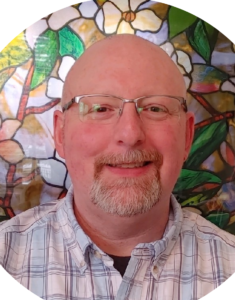
During a workshop with Dr. Steven Hayes, I badgered him about what approach to use for couples therapy that is consistent with functional contextual principles. One of them he mentioned was new to me and I haven’t tried before. The approach is called Integrative Behavioral Couples Therapy (IBCT)! With the kind heart of Dr. Andrew Christensen, one of the co-developers of IBCT, I was allowed to attend one of his workshops online. He eventually referred me to Dr. Blake Evans, one of his certified IBCT therapists, to help me with developing my skills in IBCT.
It has been a rich experience consulting with Dr. Evans and I find so much joy working with him.
Here’s a short bio of Dr. Evans, our One Life Only Consultant for Couples and Family Therapy:
Dr. Blake Evans is a Staff Psychologist at a satellite clinic of the St. Cloud VA HealthCare System in Alexandria, Minnesota. He obtained his doctoral degree in clinical psychology at Oklahoma State University in Stillwater, Oklahoma, internship at the Battle Creek VA Medical Center in Battle Creek, Michigan, and post-doctoral fellowship at the Minneapolis VA Medical Center in Minneapolis, Minnesota.
He holds a collateral position as a national trainer/consultant for the VA Family Services Division OMHS-SP for Integrated Behavioral Couple Therapy (IBCT) and was previously a trainer/consultant for Behavioral Family Therapy (BFT).
His primary professional interests lie in the assessment and treatment of relationship difficulties as well as a variety of conditions including trauma-related disorders, affective and anxiety disorders, and personality disorders. Dr. Evans’ interests also include training, consultation, and program design/improvement.
His theoretical orientation is cognitive-behavioral, with an emphasis on contemporary behavioral approaches, including Integrated Behavioral Couple Therapy (IBCT), Dialectical Behavior Therapy (DBT), and Motivational Interviewing (MI).
Thank you Blake! I have had so much enlightenment in our discussions. I count it a privilege to have you part of this One Life Only team!
Nathan
Get to know the difference in our approach to counseling…in 30 minutes!
I am quite sure that many of you think that all of the counseling practices being offered in the Philippines are just the same. Pretty much about common sense advice to deal with your difficulties in the secret life you and I have in our minds. You probably hear a lot of these in talk shows and see them online in your Google searches.
I must admit that from 2009 up to 2019, my practice varied only slightly from what was and is still widely available in the Philippines, that of a syndromal and symptom-reduction approach to therapy.
Since 2019 though, I have come across an approach that I believe jumps out as the most scientifically sound that I have ever experienced applying in my own life, as well as those that I have helped in the past two years or so!
In my zeal and excitement to share this with you, I am now offering a 30-minute session that is packed with enough information for you to see how this relatively new approach in the field of counseling and psychology works so well, and why it is now the most researched method in the world for the last 20 years!
What you will be shown is what Dr. Kevin Polk calls the Psychological Flexibility Point of View, which can neatly sum up this approach to therapy in just 30 minutes!
Feel free to reach out to us and book yourself a quick 30-minute appointment that we are confident will change your life’s direction! Yes, that’s all we ask! Thirty minutes and you are free to decide if you wish to continue your work with us or not.
You can be an individual, a couple, or a family. Just take 30 minutes of your time and see if this is something that will explain best why you and I struggle within our mental worlds!
Call or message me now at 0917 886 LIFE (5433)! I’d be more than excited to share my newfound knowledge with you, so you can start your journey towards creating that best version of you that you’ve always wanted!
Coming to An Acceptance of Your Partner or Loved One
by Nathan Chua
One of the things that our minds are really good at doing is judging. Our minds have developed this highly useful skill for the ultimate survival of our species that has very few qualities which can protect it from external threats. We don’t have large sharp teeth or claws and are said to be a species that has the longest gestation period among all creatures.
You might be curious to know how judgment can play any part in our survival, let alone the survival of a whole species. Isn’t it that we use judgment more to describe the ways we behave towards others? We are not used to using the term in light of its impact on our evolutionary history. Let’s do this little exercise to see how. If our minds didn’t know how to judge between a threat and a non-threat, we would be like the fish that get caught twice or more times by a fishing hook. Our minds are there to create rules that keep us out of harm’s way. If you see a line attached to a bait, that’s not dinner being presented to you, but you becoming somebody else’s dinner. Don’t cross the street without looking side to side. Stay indoors when your experience tells you that this is the time of the year when the weather can be harsh. This rule-following ability is what sets us apart from other species and gives us an edge of tremendous effect on who dominates the planet.
Unfortunately, this talent is double-edged. It can be useful to judge between a lion and a puppy but not when we use it to judge our internal processes. If our minds weren’t able to tell that the moving thing in front of us is a hungry lion, we could be its next prey! The mind applies the same rule to our feelings and thoughts, because the mind does what it does. Our difficult thoughts and feelings that naturally come by because of the life situations we face, are equated as bad, as in hungry lion-bad!
Couples and families often come to a judgment of their loved ones. Unfortunately, such judgments often get in the way of the loving relationships each party wishes to develop. One way of stepping out of these judgments is to consider your differences as they are and not as defects. Here’s one way to be more aware of this. Imagine if you had a loved one (either a romantic partner or a family member) who has suffered from a childhood impairment, let’s say, he or she is half-blind or has an injury that makes it difficult for them to walk at a normal pace. Would you demand that he or she be able to walk and do stuff as fast as you do? Probably not! You would most likely make adjustments to accommodate your loved one’s condition.
Given this, you and I can be more conscious of what our minds say are defects and begin to view them as conditions or differences around which we have to work. We can recognize our tendencies to see our loved ones as defective and therefore more like problems to solve rather than human beings who have learned a different way to tie a shoelace so to speak.
Another way of putting this into a clearer perspective is to notice the difference between describing a movie and judging it. A descriptive statement would be to say that the movie is an hour and 40 minutes long. While an evaluative statement would be that the movie was too long or too boring. Why don’t you try this at home? You can then experiment with a loved one that you have long judged to be defective. Just like a narrator for Nat Geo, see if you can objectively describe how your partner or child or parent behaves and say to yourself, “This is someone special who I would much rather choose to love with all his or her different behaviors that I have come to accept in the service of a truly honest and loving person that I wish to be in this and every moment.” That, my friends, is the key, not to feeling good, but to living well in spite of what your mind says are judgments to be made. It is up to you to look at those judgments and say, I choose not to run away from or struggle with my difficult experiences in dealing with this important person in my life, and to accept them above all. Be my guest and see peace arrive in your life.
Do you need counseling?
Do you need counseling for depression, anxiety, trauma, relationship (marriage, family) problems, insomnia, anger management problems, infidelity, teen parenting issues, grief processing, addiction, procrastination, work performance, and even weight issues?
We are here to provide you with evidence-based approaches that are backed by reliable and valid scientific research!
We provide both in person and online video counseling for your convenience.
Please text (preferred) or call:
Mobile Number: +63 917 886 5433 (LIFE)
Available also on Viber and WhatsApp!
(The best option is to message this number through Viber or WhatsApp and we will gladly call you back or reply!)
You can also call our booking hotline!
Booking Hotline: +632 8396 6007
The booking hotline is available 24/7!
Email:
Connect with us through Facebook, follow us through Spotify and YouTube.
Our offices are located in Quezon City, Metro Manila, Philippines.
CMS Clinic
2nd Floor Back to the Bible Building
135 West Avenue, Quezon City, Metro Manila, Philippines
and
M Place South Triangle
8004 Mother Ignacia Avenue, Quezon City, Metro Manila, Philippines
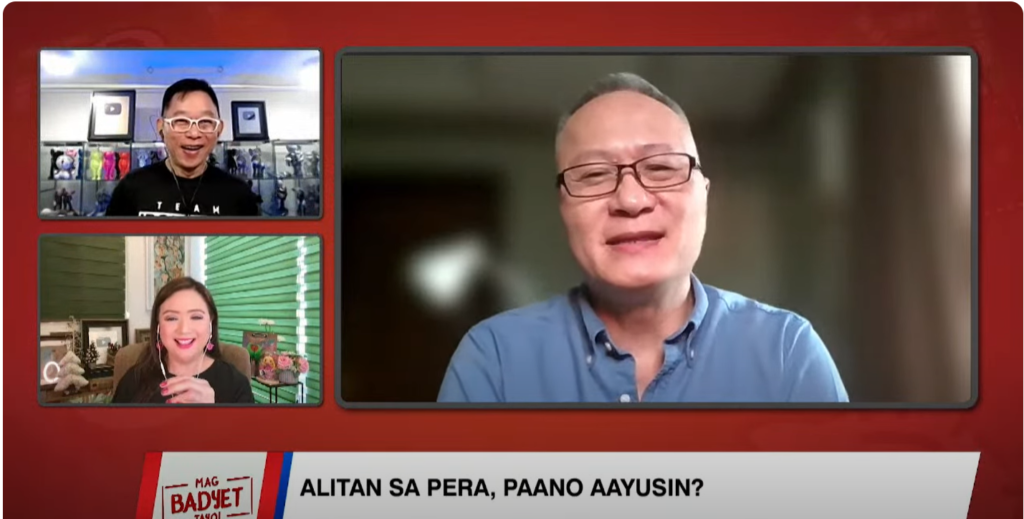
Nathaniel Chua is a member of an international organization called the Association for Contextual Behavioral Science (ACBS). He became chair of the Diversity, Equity, and Inclusion Special Interest Group (DEI-SIG) of ACBS; the first Non-North American to do so.

Nathaniel Chua has a Master’s Degree in Counseling and continues to learn more of the most cutting-edge approaches to working with the human condition.
Below is Nathaniel Chua’s first virtual talk held on November 17, 2023 in front of an international group of therapists from Low or Middle Income Countries (LMIC). He is the first from the Philippines to do this:
What is One Life Only Counseling about?
- You can be assured that your information with be kept completely confidential.
- You will be respected regardless of your religion, gender preference, ethnicity, economic status, and even your personal lifestyle and values. We are LGBTQIA+ friendly!
- Your counselor will not impose their values and beliefs on you.
- We use a scientific model of counseling that has precision, depth, and scope. Below are bullet points to let you understand better what we mean by this:
- By precision we mean that our approach to counseling tells you how these mechanisms of change work. It is not enough to say that a sense of self-awareness is what creates changes in people’s behavior. Our approach tells us how self-awareness works as one step within a set of processes that can lead to lasting change.
- Depth means the approach we use does not conflict with other theories and models of therapy. In fact, many other approaches can be used as forms of treatment towards greater psychological flexibility. Our approach for instance does not conflict with findings in the area of attachment theory, gestalt therapy, psychodynamic therapy to just raise a few examples. It cuts across other levels of analyses.
- Finally, by scope we mean that our approach comes from the discovery of the smallest set of processes that cuts across multiple mental health concerns from anxiety and depression to personality disorders to psychosis, etc. It is a transdiagnostic approach that seeks to understand what many of the symptoms or syndromes come down to, so these processes can be targeted to address many, if not all of the disorders listed in different diagnostic systems.
- We are also probably the only counseling service in the Philippines that follows a certain philosophy of science with certain a priori assumptions about human nature. With this in mind, we offer a holistic consistent approach to life’s challenges that is a-ontological, monistic, and pragmatic.
- Furthermore, ineffective behaviors are addressed by their classes and functions, therefore making our model of therapy parsimonious and much easier to apply to daily living. Most of our clients are empowered to use the skills they learn in therapy to apply to a multitude of challenging situations without having to rush to a therapist to address specific concerns. If you remember Einstein, everything can be explained by one simple equation, E = mc squared! In other words, we do our best to be ACT-Consistent or as some other experts would call it, we practice, ACT Fidelity!
The approach we use is also one that is endorsed by the World Health Organization as an effective psychological tool for coping with any kind of life crises! It can be described as a kind of psychological vaccine that has been found to be effective in improving and promoting mental resilience in the face of many, if not all kinds of life challenges.
Here’s a paraphrase from Dr. Steven C. Hayes in my interview with him on April 5th, 2022:
“Here’s what the World Health Organization, the best public health and scientific group in the world says about this protocol, this extensively tested protocol is helpful for anyone who is stressed, for any reason, in any circumstance.”
Since 2019, we have been very excited to offer this type of a radically different approach to therapy that is not just about relieving symptoms, but also about helping people towards creating lives imbued with meaning and purpose.
Here’s a video about what makes One Life Only Counseling Services different:
You can read the written version of this video through this link: https://www.onelifeonly.net/about/what-makes-one-life-only-counseling-services-different/
Here is a recent interview for an article on Philstar Life featuring Nathaniel Chua and a legal practitioner about marital sexual consent:
https://philstarlife.com/news-and-views/928796-consent-rape-marriage-explainer
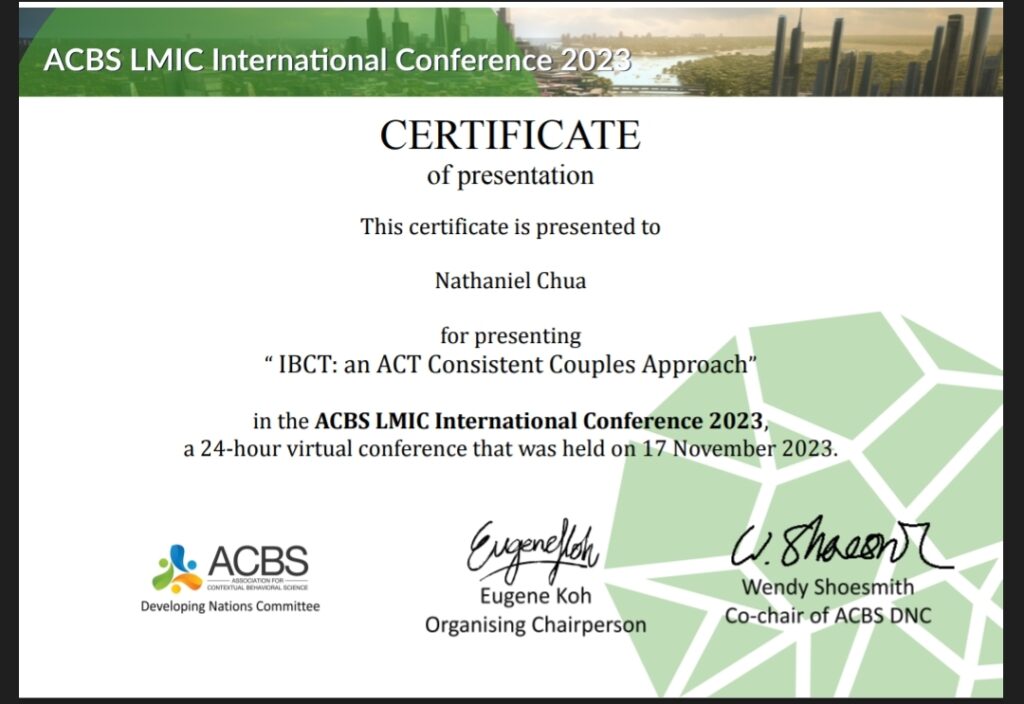

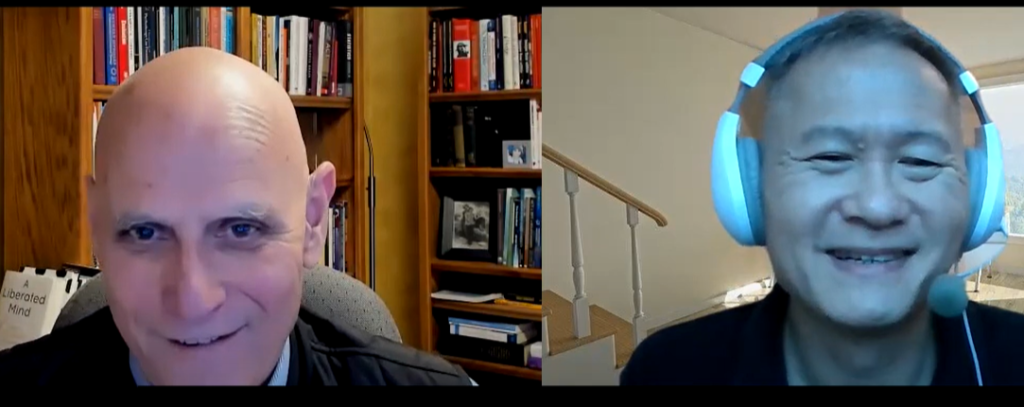
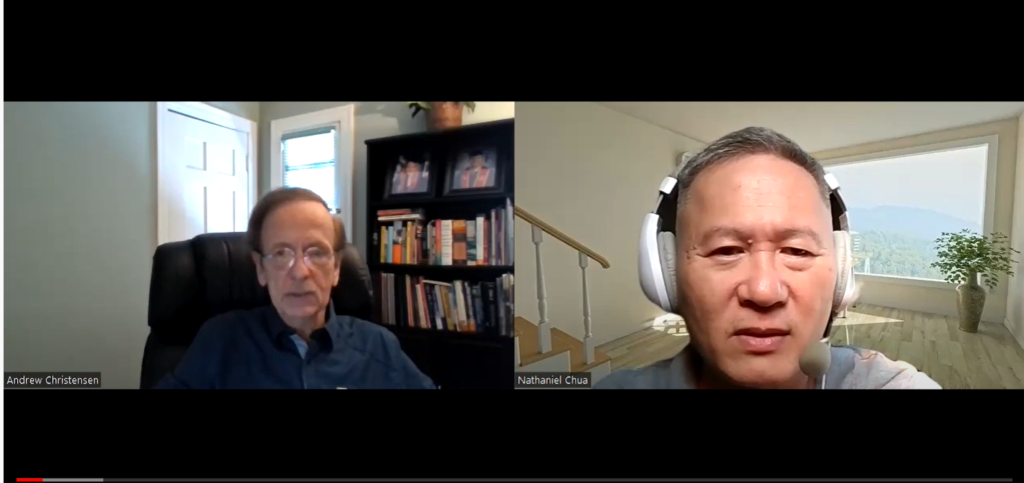
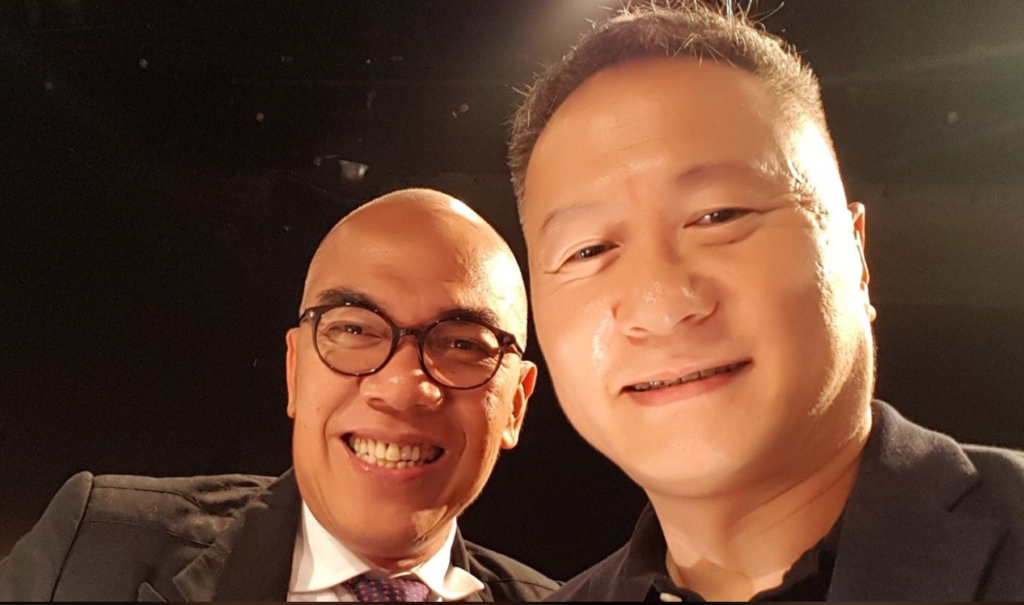

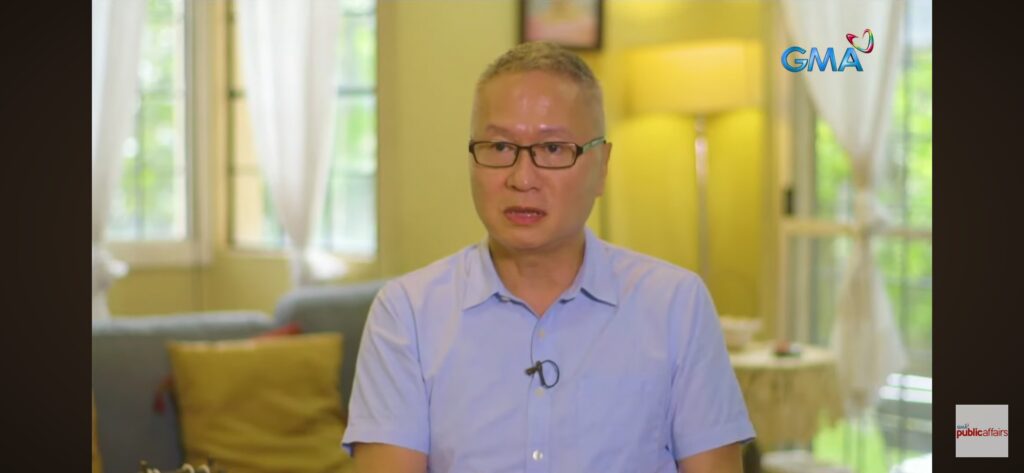
Here a video of Nathan Chua’s appearance on a “Dapat Alam Mo” Episode:
Here’s a solo interview of Nathan Chua with an ACT Matrix Expert and Counselor from the United States, Jacob Martinez:
Interviews with the experts:
Here are two interviews with the two experts that have had a huge impact on my work in recent years. They are with Dr. Steven Hayes and Dr. Andrew Christensen. Here are the videos:


